Climate, Health and Equity Brief
‘An Atlas of Human Suffering’
March 10, 2022

The Climate, Health & Equity Brief is GMMB’s take on the week’s news on the current impacts of climate change. If you haven’t subscribed yet, you can do so by clicking here.
Hot Topic: Now or Never. The latest report from the UN Intergovernmental Panel on Climate Change paints a harrowing picture of life amidst an intensifying climate crisis. The 2,000-page report—produced with inputs from more than 1,000 scientists and unanimously approved by 195 nations—lays out the clearest evidence yet that the window to avoid climate catastrophe is rapidly closing, and that if we delay immediate action to cut emissions in half this decade, we do so at our own peril.
The report finds that climate-related impacts are more severe and happening much faster than once expected. Global temperatures have risen 1.1°C (2°F) since pre-industrial times—a change that has already led to withering droughts, extreme heatwaves, massive wildfires, deadly storms or severe floods in virtually every region of the world. And the IPCC warns that if we continue with business as usual, our temperature will increase 1.5°C (2.7°F) by the early 2030s.
At that point, scientists warn, every tenth of a degree beyond 1.5°C will make the overall crisis more intense and much harder to contain—from sea-level rise and food scarcity to deadly weather events and the spread of human disease. The report also warns that at the current trajectory, the world could warm 2.4°C (3.6°F) within just 30 years—surpassing critical tolerance thresholds for agriculture and health within many of our and our children’s lifetimes.
Despite the apocalyptic findings and their need to serve as a wake-up call, there is yet more troubling news on the climate action front this week. The U.S. Supreme Court will soon hear arguments in a case that could severely restrict—or even eliminate—the EPA’s authority to curb industrial pollution. A new report found that global methane emissions from the oil, gas and coal industries are 70 percent higher than previously estimated. And despite his strong support for U.S. climate action, President Biden made scant mention of the crisis in his annual State of the Union address this week, which climate experts call a ‘missed opportunity’ as global energy markets reel from the war on Ukraine.
—Matt & Traci, GMMB
Human Health
The UN Intergovernmental Panel on Climate Change (IPCC) released a sobering report this week warning of the devastating and potentially irreversible impacts of rising temperatures on humans if immediate action isn’t taken to reduce emissions. (AP News)
The IPPC report referenced the mental health impacts of the climate crisis for the first time, with authors expressing “high confidence” in the association between high temperatures and mental health outcomes including anxiety, depression, acute stress, psychiatric hospital admissions, and suicide. (Climate Change News)
Almost three-quarters of a year’s worth of rain fell in just four days in Australia during “1 in 1,000 year” weather conditions, killing at least 17 people and forcing tens of thousands to evacuate. (The Guardian
Planetary Health
In an effort to curb global plastic pollution, the UN has adopted a historic resolution to develop a legally binding treaty by 2024 that addresses the full lifecycle of plastic and mandates reduced production of single-use plastic. (CNBC)
A new analysis by the Government Accountability Office reveals nearly one third of hazardous chemical facilities in the United States are at risk due to rising sea levels, hurricane storm surges, wildfires, or torrential flooding. (NPR)
There is a brief and rapidly closing window to secure a livable future on the planet. We need to live up to this challenge.”
– Hans-Otto Portner, IPCC report co-chair
Equity
International banks are pulling out of small island nations in the Caribbean most affected by rising sea levels, storms and drought, leaving Islanders with less access to international markets at a time when they need it most. (Bloomberg)
Politics & Economy
The Supreme Court has begun hearings on the biggest environmental case in a decade, which could severely restrict—or even eliminate—the EPA’s authority to control industrial pollution in the face of climate change. (The New York Times)
In his first State of the Union address, President Biden made little mention of the climate crisis, focusing on the potential for his climate plan to combat inflation and save the average family over $500 annually on energy costs. (E&E News)
The resurgence of coal as an energy source across Europe can be tied to the Ukrainian war as European governments once seeking to phase out the fossil fuel shift their focus to establishing energy independence from Russia. (The Wall Street Journal)
A new report suggests that methane emissions from the oil, gas and coal industries are 70 percent higher than previous estimates, underscoring the urgent need for industry-wide technological advances to reduce methane leaks. (Grist)
Life as We Know It
Under the mounting weight of eco-anxiety, young adults are driving a surge in demand for jobs at climate-mindful companies, with 51 percent of U.S. business students revealing they are willing to take a lower salary to work for an environmentally responsible employer. (BBC News)
A new study revealed that record-high annual temperatures are devastating the annual salmon harvests in Alaska’s Yukon River, canceling the 2021 harvest entirely and reducing commercial fishing earnings to just $51,480 in 2020, compared to $2.5 million in 2019 and $4.67 million in 2018. (Reuters)
Kicker
Check out the Washington Post’s illustrative postcards based on the latest IPCC report that reimagines the climate futures of Yosemite Park, Lagos, Nigeria and the Marshall Islands.
The GMMB Climate, Health & Equity Brief would not be possible without the contributions of the larger GMMB California team—Aaron Benavides, Elke Cortes, Sharde Olabanji, Adrian Plaisance and Stefana Simonetto. Feedback on the Brief is welcome and encouraged and should be sent to CHandEBrief@gmmb.com.






